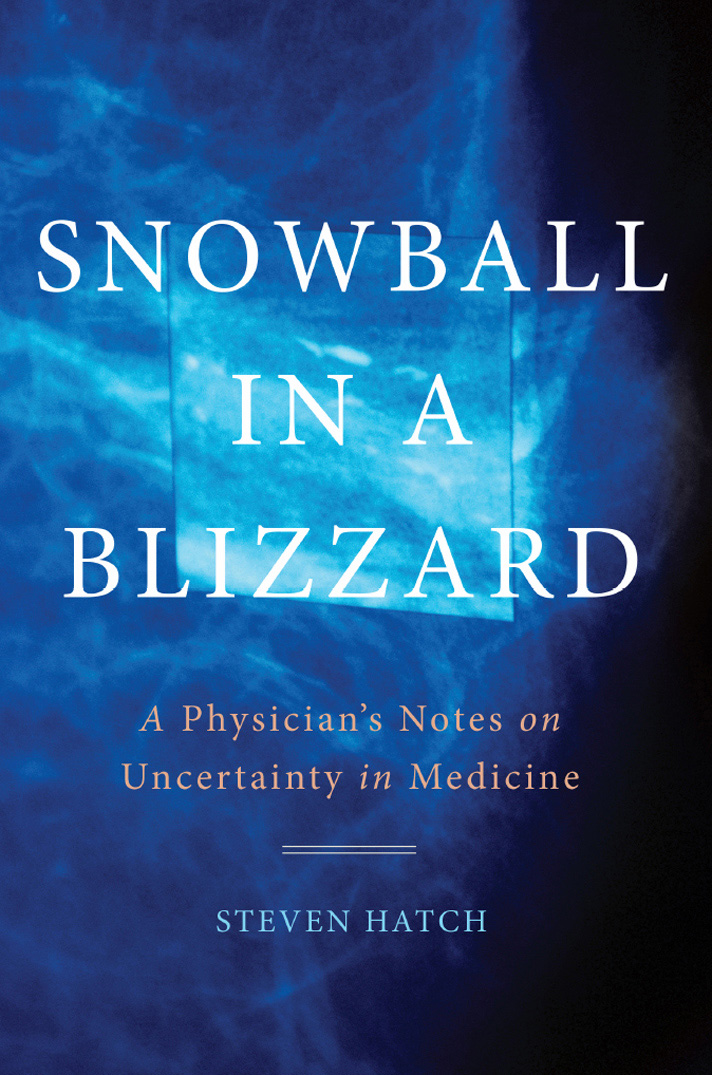

Copyright 2016 by Steven Hatch
Published by Basic Books,
A Member of the Perseus Books Group
All rights reserved. Printed in the United States of America. No part of this book may be reproduced in any manner whatsoever without written permission except in the case of brief quotations embodied in critical articles and reviews. For information, address Basic Books, 250 West 57th Street, New York, NY 10107.
Books published by Basic Books are available at special discounts for bulk purchases in the United States by corporations, institutions, and other organizations. For more information, please contact the Special Markets Department at the Perseus Books Group, 2300 Chestnut Street, Suite 200, Philadelphia, PA 19103, or call (800) 810-4145, ext. 5000, or e-mail .
Library of Congress Cataloging-in-Publication Data
Names: Hatch, Steven, 1969, author.
Title: Snowball in a blizzard: a physicians notes on uncertainty in medicine / Steven Hatch.
Description: New York: Basic Books, a member of the Perseus Books Group, [2016] | Includes bibliographical references and index. | Description based on print version record and CIP data provided by publisher; resource not viewed.
Identifiers: LCCN 2015042274 (print) | LCCN 2015041457 (ebook) | ISBN 9780465098576 (eb)
Subjects: | MESH: Diagnosis. | Uncertainty. | Health Policy.
Classification: LCC RC71 (print) | LCC RC71 (ebook) | NLM WB 141 | DDC 616.07/5dc23
LC record available at http://lccn.loc.gov/2015042274
10 9 8 7 6 5 4 3 2 1
FOR MY MOTHER AND FATHER
sorry, Pops, wish I coulda got it done sooner
Table of Contents
Guide
Contents
Confusion + Science = Answers*
*Answers may require years of studying (real studying, not humanities studying) to be understood and will be expressed in terms of probability rather than absolute certainty.
C. G. P. GREY
The diagnostic enterprise hinges on an optimistic notion that disease is part of a natural world that only awaits our understanding. But even if this is true, nature gives up its secrets grudgingly, and our finite senses are in some ways ill-suited to extracting them.
GARY GREENBERG
THIS BOOK IS A SURVEY OF THE LANDSCAPE OF UNCERTAINTY IN MODERN medicine. My goal is to give the reader a sense of the challenges that can be found in all areas of medicine, which means that I cover a broad swath of topics ranging from cancer to womens health to cardiovascular disease to infectious disease and others besides. Because I want people to see the thread connecting these topics, I cant give comprehensive explanations about each of the issues Ill touch on. One could write a very long and engaging book about mammography; here Im going to discuss it in a few thousand words just to give you a sense for the underlying data and why people have interpreted the utility of mammograms in contradictory ways, which has led to dueling recommendations for its use.
Specialists reading this may throw their hands up in frustration over what they perceive to be oversimplifications of particular studies, as well as an anemic bibliography. Perhaps I am guilty as charged. My hope is that by actually taking data straight off the journal page and putting it in front of readers, but doing it in a selective manner so it is framed by explanations helping them to make sense of it, they will have a sense of how the process works and will find medical research a little less mystifying.
Too often academics are chided by their colleagues for attempts at popularizing their field, which by necessity requires stripping away some of the layers of complexity. I have found far too many scholarly books whose topics look interesting but are written in Academicish, leaving lay readers to struggle with impenetrable language or heaps of detail that obscure the main point. I will endeavor to find that sweet spot where readability and scholarliness overlap. In doing so, I hope to provide readers with a nodding acquaintance on human-subjects research, with the understanding that there is more to the story on any of the topics about which Ill write.
An additional disconnect between academics and the general public involves citations. In academia, you cant even take a pee without providing seven references on who was the first person in that restroom, what studies have been done on the traffic of the restroom, research on the flushing dynamics, et cetera. Because our careers are tied to making observations that nobody else has made before, were understandably a bit jumpy when people take credit for our work inappropriately, so were very careful to attribute every assertion.
My impression is that lay readers are far less interested in this citation game. Personally, I hate reading a book with footnotes (especially when theyre at the end of the chapter, which makes me have to flip back and forth) only to discover that a given footnote is just a reference when I thought it might be an aside providing further illumination on the topic in question. However this is a book about a very highly academic field, so Ive settled on a compromise where footnotes are brief digressions, and references can be found in the bibliography. I wont, however, offer up specific citations to those references in the text. This may make the occasional academic apoplectic, but it cant be helped.
Throughout much of the book, I use the term doctors and physicians to describe many different kinds of people, not all of whom are doctors or physicians. In many parts of the country, nurses now have wide latitude in making medical decisions and some have as much independence as full physicians. Additionally, the rise of the physician assistant (PA)a title that sounds like they have less training than nurses when in fact they have more, occupying a true middle groundhas introduced a whole new type of health-care provider to medicine, and they typically make medical decisions indistinguishable from those of their physician colleagues. I therefore use physician and doctor as convenient umbrella terms to refer to all these professionals in the interests of not burdening the reader with a more accurate but distracting description. I apologize in advance to my nursing and PA colleagues for the shorthand.
For the most part, this book is not a chronicle of my personal experiences as a physician, and as such it does not focus on patients I have encountered. The one exception is in the chapter on Lyme, in which I discuss a patient named David Marsh. David is not an actual patient but is rather a composite of many patients I have seen over several years as part of consultations on Lyme. No former patient of mine should fear that I am exposing their lives in some easily identifiable manner on the printed page.
As noted in the Acknowledgments, I am grateful to many colleagues who have provided their insights in areas beyond what modest clinical expertise I possess. If I have made any penetrating or illuminating observations in this book, the entirety of credit should go to them. But any inaccuracies, misrepresentations of fact, or failures of communication are due to me and me alone. I have endeavored to paint a picture of what I think is a critical problem in medicine today, but if I have not succeeded in this task, I humbly ask the readers forgiveness.











